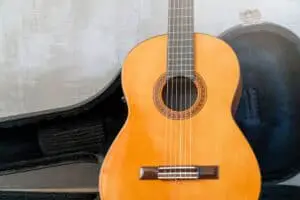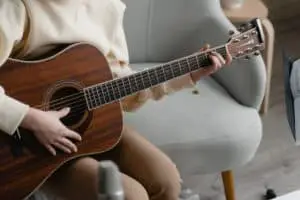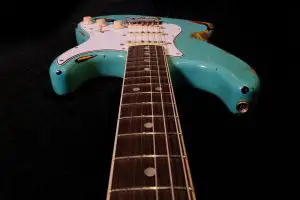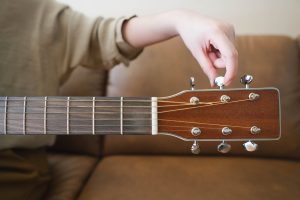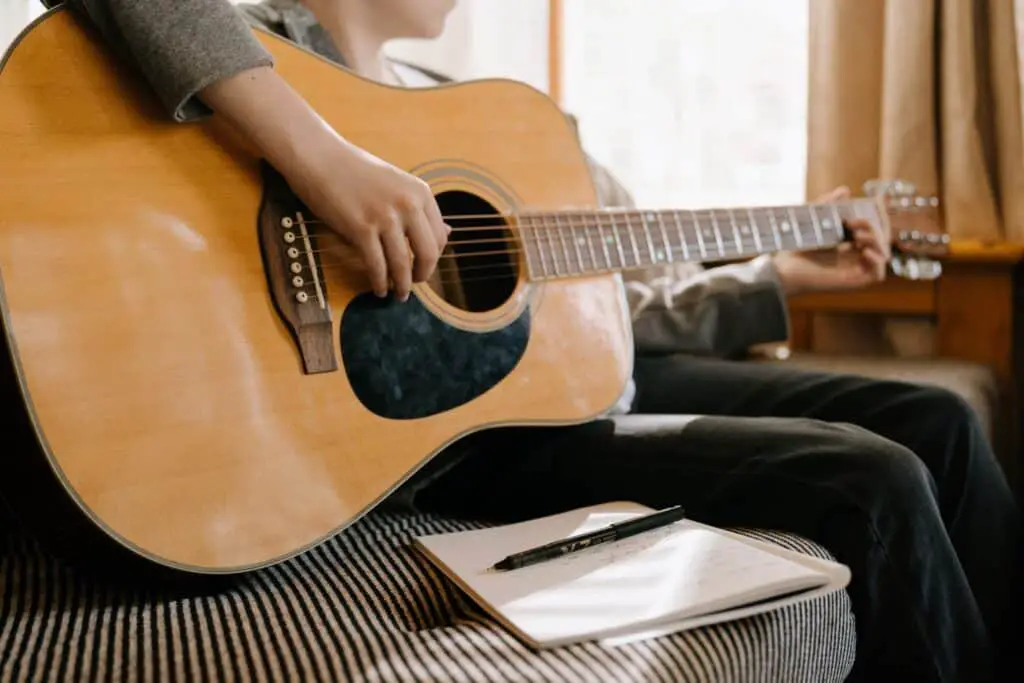
A beginner guitar can be an excellent investment for anyone looking to learn how to play the guitar. These affordable instruments are perfect for beginners who are just starting, as they provide all of the essential features that you need to get started learning this wonderful instrument. Whether you’re a child or an adult, a beginner guitar is a great way to explore your musical interests and develop your skills.
So, how much does a beginner guitar cost?
Beginner guitars can be found for as little as $100, although you may need to pay a bit more if you’re looking for a higher-quality instrument. If you’re starting, it’s important to choose an instrument that is comfortable and easy to play, so don’t be afraid to spend a bit extra on a better-quality guitar. You’ll thank yourself later.
This article will provide an overview of what to look for when buying a beginner guitar and some best examples. We’ll also give you a few tips on how to get the most out of your new instrument and make sure that you’re playing your best. By the end, you’ll be ready to rock out with the best of them. Let’s get started.
Factors to Consider When Purchasing a Beginner Guitar

When choosing a beginner guitar, you should be keen on the following;
Size and Weight
One of the most important things to consider when choosing a beginner guitar is the size and weight of the instrument. You want to make sure that the guitar is comfortable holding and playing, especially if you’re a child or have small hands. If you’re an adult, you may want to consider a larger guitar with large hands or long fingers.
Neck Width
The neck of the guitar should be wide enough that your hand can comfortably wrap around it. Look for a neck that is about 1.5 inches wide at the nut. If the neck is too thin, it can be uncomfortable to play.
Frets and Neck Joint
You want to make sure you choose an instrument with a smooth fretboard free of any dead spots or sharp edges. Try playing a few chords on the neck before buying your beginner guitar to see how it feels and sounds. As for the neck joint, look for an instrument with two or three bolts holding the neck in place instead of just one (look for a set of three dots on either side of the body). This will ensure that your guitar stays in tune longer and plays better as you advance.
Body Material and Construction
When choosing your beginner guitar, several different types of materials and construction methods are available. The most common materials are wood, metal, and plastic. Each has its unique sound and feel, so it’s important to try out a few different types before settling on one.
Pickguard
A pickguard is a thin piece of material that covers the guitar’s body near the strings. It’s there to protect the body from being scratched by your pick as you play. Many beginner guitars come with a pickguard already installed, but if yours doesn’t, you can easily install one yourself.
Strings and Tuning
When purchasing a beginner guitar, you want to ensure that it’s properly tuned and has the correct strings installed. Look for a guitar with six strings; although many guitars have seven these days, the extra string is usually a low B. Make sure the strings are firmly anchored in their slots and not too loose or too tight. Finally, check that each string is tuned to a standard E tuning: EADGBE.
Brand and Price
It’s also important to consider the brand and price of your new instrument, as some brands are known for being more durable or having better sound quality than others. Keep in mind that higher-quality guitars will last longer and be easier to play. As for price, it’s best to stick with a guitar within your budget, as you don’t want to break the bank just yet.
How Can I Get the Most Out of My Beginner Guitar?

Once you’ve chosen an instrument that matches your needs, there are several things you can do to get the most out of it. Here are a few tips:
Practice Regularly
The best way to become a better musician is simply by practicing as much as possible. Set aside time each day to play your guitar and work on different techniques or new songs.
Take Lessons
Even if you’ve played music in the past, it’s a good idea to seek out some professional guidance as you start playing again. A qualified teacher can help you improve your skills and advise how to get the most out of your instrument.
Invest In Quality Gear
Along with a great beginner guitar, several accessories will help make practicing more accessible and enjoyable. These include a tuner, metronome, training software, instructional books/DVDs, and an amplifier depending on whether or not your guitar is acoustic.
Best Beginner Guitar Examples
Here are four great options for those just starting:
Yamaha C40 Classical Guitar ∼ $100
Thanks to its low price and quality construction, the Yamaha C40 is excellent for beginners. It features a spruce top, maple back and sides, and a rosewood fretboard. It also comes with a gig bag, so you can take it wherever you go.
Fender CD-60SCE Dreadnought ∼ $300
If you’re looking for an acoustic guitar, the Fender CD-60SCE is an excellent option. It features a solid spruce top, mahogany back and sides, and a rosewood fretboard. It also comes with a gig bag, so you can take it wherever you go.
Ibanez GRGM21MiK Mikro Electric Guitar ∼ $200
If you’re interested in an electric guitar, the Ibanez GRGM21MiK Mikro is excellent for beginners. It’s a mini guitar, so it’s easy to play and transport. It features a maple neck, basswood body, and a rosewood fretboard. It also comes with an amplifier, so you can start playing right away.
Squier by Fender Bullet Stratocaster Electric Guitar ∼ $200
The Squier by Fender Bullet Stratocaster is another great option for those interested in an electric guitar. It’s a full-size guitar, so it’s easy to play and transport. It features an alder body, a maple neck, and a rosewood fretboard. It also comes with an amplifier, so you can start playing right away.
Conclusion
Whether you’re a beginner or an experienced musician, many great guitars are available on the market today. By choosing a quality instrument that suits your needs and budget, you can enjoy many years of music-making. Good luck.




